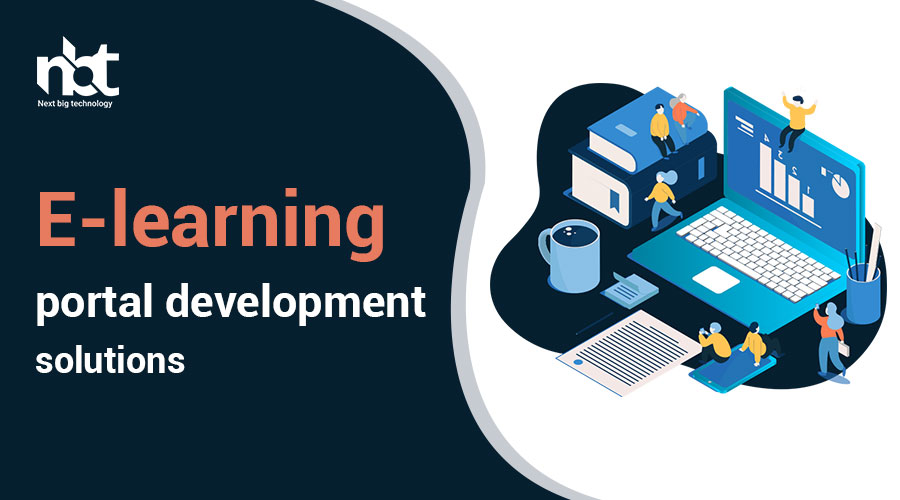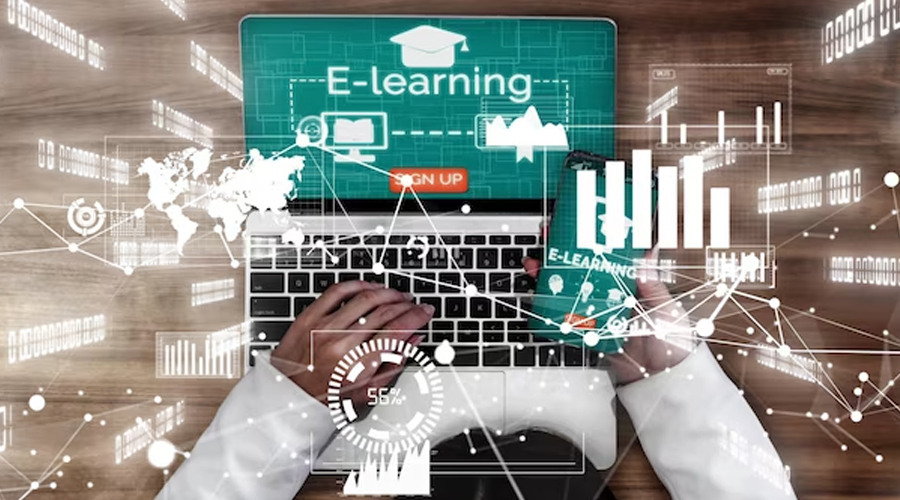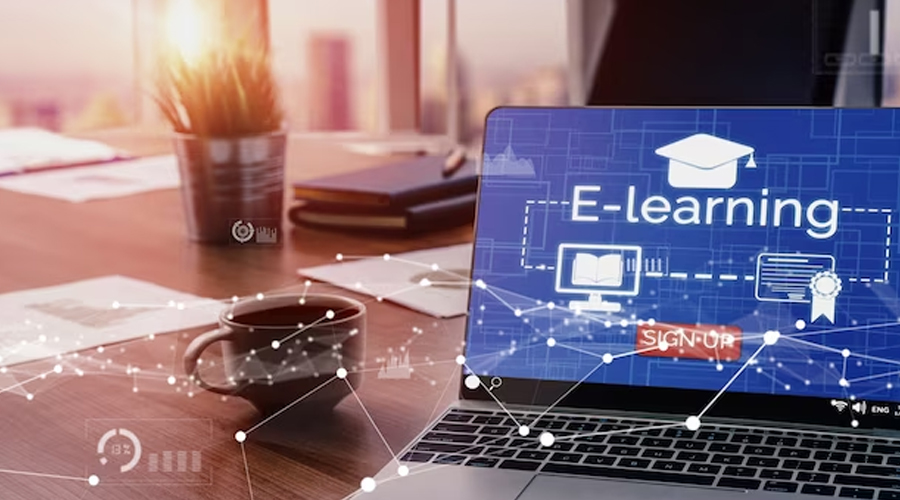Table of Contents
E-learning portal development solutions Services
In today’s fast-paced digital era, the landscape of education is rapidly evolving, with traditional classrooms making way for innovative online learning platforms. E-learning portals have emerged as powerful tools that offer flexible, accessible, and interactive learning experiences to students of all ages and backgrounds. With the growing demand for remote education solutions, the development of e-learning portals has become paramount. Let’s delve into the world of e-learning portal development solutions and explore how they are revolutionizing the way we learn.
Understanding E-Learning Portal Development Solutions
E-learning portal development solutions encompass a wide range of services aimed at creating robust online platforms for educational purposes. These portals serve as virtual classrooms where learners can access course materials, interact with instructors, collaborate with peers, and track their progress conveniently from any location with an internet connection.
Key Features and Functionalities
- User-Friendly Interface: E-learning portals are designed with intuitive interfaces to ensure ease of navigation for both instructors and learners. Intuitive dashboards, organized course structures, and clear instructions contribute to a seamless user experience.
- Multimedia Content Integration: Rich multimedia content such as videos, interactive presentations, simulations, and quizzes enhance engagement and comprehension. E-learning portals support the integration of diverse content formats to cater to different learning styles.
- Collaborative Tools: Collaborative tools such as discussion forums, chat rooms, and virtual classrooms foster interaction and knowledge sharing among learners. These features simulate the collaborative aspect of traditional classrooms in an online environment.
- Assessment and Feedback Mechanisms: Built-in assessment tools enable instructors to create quizzes, assignments, and exams to evaluate learners’ progress. Immediate feedback mechanisms provide learners with valuable insights into their performance, facilitating continuous improvement.
- Customization and Scalability: E-learning portals are highly customizable to meet the unique requirements of educational institutions, businesses, or independent educators. They are also scalable, allowing for future expansion and the addition of new features as needed.
Benefits of E-Learning Portal Development Solutions
- Accessibility: E-learning portals break down geographical barriers, allowing learners to access educational resources from anywhere in the world. This accessibility promotes inclusivity and expands learning opportunities for individuals with diverse backgrounds and circumstances.
- Flexibility: With e-learning portals, learners have the flexibility to study at their own pace and schedule. They can balance their educational pursuits with work, family, or other commitments, leading to a more personalized learning experience.
- Cost-Effectiveness: E-learning portals eliminate the need for physical infrastructure and reduce overhead costs associated with traditional classroom-based learning. This cost-effectiveness makes online education more affordable and accessible to a wider audience.
- Real-Time Analytics: E-learning portals generate comprehensive analytics and reports that provide insights into learners’ progress, engagement levels, and areas for improvement. This data-driven approach enables instructors to tailor their teaching strategies and interventions accordingly.
- Continuous Learning and Development: E-learning portals support lifelong learning by offering a diverse range of courses, workshops, and resources. Learners can continuously update their skills and knowledge to stay relevant in today’s rapidly changing job market.
How to Create a E-learning portal development solutions
In today’s digital age, the demand for online education is skyrocketing. With the convenience it offers, more and more people are turning to e-learning platforms for their educational needs. If you’re considering diving into the realm of online education by creating your own e-learning portal, you’re on the right track. However, developing an effective e-learning portal requires careful planning and execution. In this guide, we’ll walk you through the steps to create a successful e-learning portal development solution.
- Define Your Goals and Audience: Before you start developing your e-learning portal, it’s essential to clearly define your goals and identify your target audience. Are you catering to students, professionals, or hobbyists? What subjects or skills will your platform focus on? Understanding your objectives and audience will help you tailor your platform to meet their needs effectively.
- Choose the Right Technology Stack: Selecting the appropriate technology stack is crucial for the success of your e-learning portal. Consider factors such as scalability, security, and user experience when choosing the platform, programming languages, and frameworks for development. Popular choices for e-learning portals include Moodle, WordPress with LMS plugins, and custom-built solutions using technologies like Ruby on Rails or Django.
- Design an Intuitive User Interface: A user-friendly interface is key to engaging learners and ensuring they have a positive experience on your platform. Invest time in designing an intuitive layout with easy navigation, clear instructions, and visually appealing elements. Make sure your design is responsive, ensuring a seamless experience across devices.
- Implement Robust Features: Your e-learning portal should offer a range of features to facilitate learning and collaboration. Key features to consider include course management, user authentication, content delivery, assessment tools, discussion forums, and progress tracking. Incorporating interactive elements such as quizzes, videos, and gamification can enhance user engagement.
- Focus on Content Quality: The success of your e-learning portal hinges on the quality of the content you provide. Curate or create high-quality educational materials that are informative, engaging, and relevant to your target audience. Offer a variety of content formats, including text, videos, animations, and interactive simulations, to cater to different learning styles.
- Ensure Scalability and Performance: As your e-learning portal grows, it’s essential to ensure scalability and optimal performance. Choose a hosting solution that can accommodate increasing traffic and user interactions without compromising speed or reliability. Regularly monitor and optimize your platform to address any performance issues promptly.
- Integrate Analytics and Reporting: Incorporating analytics tools into your e-learning portal allows you to track user behavior, assess course effectiveness, and make data-driven decisions to improve the learning experience. Implement features such as user activity tracking, course completion rates, and assessment analytics to gain insights into learner progress and engagement.
- Provide Ongoing Support and Updates: Building a successful e-learning portal is an ongoing process that requires continuous improvement and support. Offer comprehensive technical support to assist users with any issues they encounter and regularly update your platform with new features, content, and improvements based on user feedback and emerging trends.
Why Should You Go for E-learning portal development solutions
In today’s fast-paced digital world, the realm of education is undergoing a profound transformation, with e-learning emerging as a frontrunner. With the rise of e-learning portal development solutions, traditional educational paradigms are being challenged and reshaped. This shift is not merely a trend but a fundamental evolution in how we acquire knowledge and skills. Here, we delve into the compelling reasons why opting for e-learning portal development solutions is a decision that can revolutionize education for individuals and institutions alike.
- Accessibility and Flexibility: E-learning portals break down the barriers of time and space, offering unparalleled accessibility to educational resources. Learners can access content anytime, anywhere, allowing for flexibility that traditional classroom settings cannot provide. Whether it’s a student juggling multiple responsibilities or a professional seeking to upskill while balancing work commitments, e-learning accommodates diverse schedules and lifestyles.
- Cost-Effectiveness: Traditional education often comes with hefty price tags, including tuition fees, commuting expenses, and course materials. E-learning portal development solutions significantly reduce these costs by eliminating the need for physical infrastructure and printed materials. Institutions can streamline their expenses while learners benefit from more affordable education options, making knowledge acquisition more inclusive and equitable.
- Personalized Learning Experience: One of the most significant advantages of e-learning portals is their ability to cater to individual learning styles and paces. Through adaptive learning technologies and personalized recommendations, learners receive tailored content and assessments suited to their strengths and weaknesses. This personalized approach enhances engagement, comprehension, and retention, ultimately fostering a more effective learning experience.
- Diverse Learning Resources: E-learning portals offer a vast repository of multimedia resources, including interactive modules, videos, simulations, and online assessments. This diverse range of content enhances engagement and comprehension by catering to different learning preferences. Whether visual, auditory, or kinesthetic, learners can choose the resources that best suit their needs, promoting deeper understanding and mastery of the subject matter.
- Scalability and Reach: E-learning portals have the inherent advantage of scalability, allowing institutions to accommodate growing numbers of learners without constraints imposed by physical infrastructure. This scalability extends beyond geographical boundaries, enabling institutions to reach a global audience and expand their educational impact exponentially. From small businesses to multinational corporations, e-learning portals offer scalable solutions for training and development needs.
- Data-Driven Insights: E-learning portals generate vast amounts of data on learner interactions, performance, and preferences. Leveraging analytics tools, institutions can gain valuable insights into learner behavior, identify areas for improvement, and refine their educational offerings accordingly. This data-driven approach empowers institutions to continuously enhance the effectiveness and relevance of their e-learning programs, ensuring maximum impact and learner satisfaction.
- Adaptability to Changing Needs: In today’s dynamic landscape, where knowledge is constantly evolving, adaptability is key to staying relevant. E-learning portals provide the agility to update content swiftly in response to changing industry trends, emerging technologies, or revised curriculum standards. This ensures that learners receive the most up-to-date and comprehensive education, equipping them with the skills needed to thrive in an ever-changing world.
Market Prospects of E-learning portal development solutions
In recent years, the landscape of education has undergone a significant transformation with the proliferation of e-learning platforms. As traditional methods of learning continue to evolve, the demand for innovative e-learning portal development solutions is on the rise. In this article, we delve into the market prospects of e-learning portal development solutions, examining the driving factors behind their growth and the opportunities they present.
- Rapid Growth of the E-Learning Industry: The global e-learning market has been experiencing exponential growth, driven by factors such as technological advancements, increasing internet penetration, and the growing adoption of online education. This growth trajectory creates a favorable environment for e-learning portal development solutions, as educational institutions and organizations seek robust platforms to deliver engaging and interactive learning experiences.
- Demand for Customized Learning Solutions: One of the key drivers of the market prospects for e-learning portal development solutions is the demand for customized learning experiences. Educational institutions, corporates, and independent educators are looking for tailor-made platforms that cater to their specific requirements and objectives. E-learning portal development solutions offer the flexibility to create personalized learning environments, thereby meeting the diverse needs of learners and educators alike.
- Embracing Remote Learning: The COVID-19 pandemic has accelerated the adoption of remote learning, forcing educational institutions to explore digital alternatives to traditional classroom-based teaching. E-learning portal development solutions have emerged as a crucial enabler of remote learning initiatives, providing seamless access to educational resources and facilitating interactive online collaboration. As remote learning becomes increasingly ingrained in educational practices, the demand for robust e-learning portals is expected to surge.
- Focus on User Experience and Engagement: In today’s digital age, user experience (UX) plays a pivotal role in the success of any online platform. E-learning portal development solutions are placing greater emphasis on UX design, aiming to create intuitive interfaces that enhance engagement and facilitate effective learning. Features such as multimedia content, gamification elements, and social learning tools are being integrated into e-learning portals to make the learning experience more immersive and interactive.
- Global Reach and Accessibility: One of the inherent advantages of e-learning portal development solutions is their ability to transcend geographical boundaries, enabling learners to access educational content from anywhere in the world. This global reach opens up vast opportunities for e-learning providers to tap into new markets and cater to diverse audiences. By offering multilingual support and localization options, e-learning portals can further enhance their accessibility and appeal to learners from different cultural backgrounds.
- Integration of Advanced Technologies: The evolution of e-learning portal development is closely intertwined with advancements in technology such as artificial intelligence (AI), machine learning (ML), and augmented reality (AR). These technologies are being leveraged to create intelligent learning systems that personalize content delivery, provide real-time feedback, and enhance learner engagement. As the capabilities of these technologies continue to expand, e-learning portal development solutions will become increasingly sophisticated, offering innovative features and functionalities.
Advanced Features of a E-learning portal development solutions
In the realm of education, technology continues to revolutionize the way we learn and teach. E-learning portals have emerged as powerful platforms that facilitate seamless education delivery, enabling institutions, educators, and learners to connect and engage in virtual learning environments. As the demand for online education grows, the need for advanced features in e-learning portal development solutions becomes increasingly apparent. Let’s delve into some of these advanced features that are shaping the future of online learning:
- Personalized Learning Paths: One of the key advantages of e-learning portals is the ability to cater to individual learning needs. Advanced solutions leverage data analytics and artificial intelligence to analyze learner behavior and preferences, allowing for the creation of personalized learning paths. By tailoring content and recommendations based on each learner’s strengths, weaknesses, and interests, personalized learning paths enhance engagement and improve learning outcomes.
- Interactive Content Delivery: Gone are the days of static text-based learning. Advanced e-learning portals offer interactive content delivery features such as videos, simulations, gamified activities, and virtual reality experiences. These immersive learning experiences not only capture learners’ attention but also foster deeper understanding and retention of concepts.
- Collaborative Learning Tools: Collaboration is a cornerstone of effective learning. E-learning portals integrate collaborative tools such as discussion forums, group projects, and real-time chat functionalities to facilitate interaction and knowledge sharing among learners. Additionally, features like peer assessment and collaborative editing enable learners to actively participate in the learning process and develop essential teamwork skills.
- Assessment and Feedback Mechanisms: Assessing learners’ progress is essential for gauging their understanding and identifying areas for improvement. Advanced e-learning portals offer robust assessment tools, including quizzes, assignments, and exams, with customizable grading criteria. Moreover, built-in analytics provide real-time insights into learner performance, allowing instructors to offer timely feedback and intervention when needed.
- Mobile Compatibility and Offline Access: With the proliferation of mobile devices, e-learning portals must be accessible anytime, anywhere. Advanced solutions prioritize mobile compatibility, ensuring seamless user experiences across devices of varying screen sizes. Moreover, offline access capabilities enable learners to download course materials and participate in activities even without an internet connection, catering to diverse learning environments and preferences.
- Integration with Learning Management Systems (LMS): E-learning portals often integrate with LMS platforms to streamline administrative tasks such as course management, enrollment, and progress tracking. Advanced integration capabilities enable seamless data synchronization between the e-learning portal and existing LMS systems, ensuring a cohesive learning ecosystem for institutions and learners.
- Adaptive Learning Algorithms: Adaptive learning algorithms are at the forefront of personalized education. These algorithms continuously analyze learner performance and dynamically adjust content and difficulty levels to meet individual learning needs. By providing tailored learning experiences in real-time, adaptive learning algorithms optimize learning efficiency and effectiveness.
- Accessibility and Inclusivity Features: Ensuring accessibility for all learners, including those with disabilities, is paramount in e-learning portal development. Advanced solutions incorporate accessibility features such as screen readers, keyboard navigation, and alternative text for multimedia content to accommodate diverse learner needs and promote inclusivity.
E-learning portal development solutions Timelines
In the contemporary digital landscape, the demand for E-learning portal development solutions is soaring higher than ever before. With the world embracing remote learning as a necessity rather than a luxury, businesses, educational institutions, and organizations are keen on establishing robust online learning platforms. However, amidst the excitement of embarking on this journey, it’s crucial to outline a well-structured timeline to ensure a smooth and efficient development process.
Understanding the Scope: Before diving into the intricacies of timeline creation, it’s imperative to have a comprehensive understanding of the project scope. This involves identifying key objectives, target audience, desired features, and the overall vision for the E-learning portal. Clear communication between stakeholders at this stage is vital to align expectations and lay a solid foundation for the development journey.
Planning Phase: Once the scope is defined, the next step is to meticulously plan out the development process. This includes breaking down the project into smaller tasks or milestones, assigning responsibilities, and estimating timeframes for each stage. Collaborative tools and project management software can be immensely helpful in organizing tasks and tracking progress throughout the timeline.
Design and Development: The design and development phase is where the magic happens. This stage involves creating wireframes, designing user interfaces, developing backend functionalities, and integrating necessary features such as video conferencing, interactive quizzes, and content management systems. Depending on the complexity of the project, this phase can take several weeks to months to complete.
Testing and Quality Assurance: Before the E-learning portal is ready to launch, rigorous testing and quality assurance measures must be undertaken to ensure optimal performance and user experience. This includes conducting functional testing, usability testing, compatibility testing across different devices and browsers, as well as addressing any bugs or glitches that may arise during the testing process.
Content Creation and Integration: While the technical aspects of the portal are essential, equally crucial is the content that will be hosted on the platform. Whether it’s educational modules, video lectures, interactive assignments, or supplementary resources, content creation should be an ongoing process parallel to the development timeline. Integrating content seamlessly into the portal and ensuring its relevance and accuracy are paramount to its success.
Launch and Deployment: Finally, the moment arrives to unveil the E-learning portal to the world. However, launching the platform is not the endpoint but rather the beginning of a new phase. Deployment involves configuring servers, setting up domain names, implementing security measures, and ensuring scalability to accommodate growing user demands. Additionally, providing comprehensive training and support for administrators, instructors, and users is essential for a successful launch.
Post-Launch Maintenance and Updates: Once the E-learning portal is live, the journey is far from over. Continuous monitoring, maintenance, and updates are necessary to keep the platform running smoothly and adapt to evolving user needs and technological advancements. Regular feedback from users should be solicited to identify areas for improvement and implement enhancements accordingly.
How Much Does It Cost to Build a E-learning portal development solutions ?
In today’s digital age, the demand for e-learning platforms has surged exponentially, driven by the need for accessible and flexible education solutions. Whether you’re an educational institution, a corporate entity, or an individual entrepreneur looking to venture into the realm of online learning, understanding the costs associated with building an e-learning portal is crucial for effective planning and budgeting.
- Initial Planning and Analysis: Before diving into development, it’s essential to conduct thorough research and analysis to determine your specific requirements and objectives. This phase involves defining the scope of your e-learning portal, identifying target audiences, outlining features and functionalities, and assessing technical feasibility. Costs incurred during this stage primarily include consultation fees, market research expenses, and resource allocation for project management.
- Platform Development: The development phase encompasses the actual creation of the e-learning portal, including frontend and backend development, database integration, user interface (UI) design, and content management system (CMS) implementation. Costs here depend on various factors such as the complexity of features, customization requirements, technology stack chosen (e.g., PHP, Python, Ruby on Rails), and the development approach (in-house development vs. outsourcing). Additionally, expenses related to server setup, domain registration, and security measures should be accounted for in this phase.
- Content Creation and Integration: Content is king in the realm of e-learning, and investing in high-quality educational material is paramount for engaging learners. Depending on your niche and target audience, you may need to develop or source multimedia content, including videos, interactive simulations, quizzes, assessments, and downloadable resources. Costs associated with content creation may vary based on factors like production quality, subject matter expertise, and licensing fees for third-party content providers.
- LMS Integration and Customization: Many e-learning portals leverage Learning Management Systems (LMS) to streamline course delivery, student management, and assessment tracking. Integrating a robust LMS into your portal can enhance its functionality and scalability. However, customization requirements to align the LMS with your specific needs may incur additional costs. Popular LMS options like Moodle, Canvas, and Blackboard offer both open-source and commercial solutions, each with its associated pricing model.
- Testing and Quality Assurance: Ensuring the reliability, performance, and security of your e-learning portal is crucial for delivering a seamless user experience. Quality assurance activities, including testing for functionality, usability, compatibility, and security vulnerabilities, are integral parts of the development lifecycle. Allocating resources for thorough testing and bug fixing helps mitigate risks and prevents potential setbacks post-launch.
- Maintenance and Support: Building an e-learning portal is not a one-time endeavor; it requires ongoing maintenance, updates, and technical support to keep it running smoothly. Budgeting for post-launch maintenance services, including software updates, server maintenance, troubleshooting, and user support, is essential for the long-term success and sustainability of your e-learning platform.
How to Create a E-learning portal development solutions – Team and Tech Stack
In today’s digital age, e-learning has emerged as a cornerstone of education, offering flexible and accessible learning experiences. As the demand for online education grows, the importance of creating a robust e-learning portal becomes increasingly evident. Developing such a portal requires careful planning, a skilled team, and the right technology stack. In this article, we’ll explore the essential steps to create an e-learning portal and discuss the key components of both the team and the technology stack needed for its development.
Understanding the Vision
Before diving into development, it’s crucial to have a clear understanding of the vision for your e-learning portal. Consider the target audience, learning objectives, and the type of content you plan to deliver. Whether it’s K-12 education, professional development, or specialized training courses, defining your goals will guide the development process and ensure alignment with user needs.
Building the Right Team
Creating an e-learning portal requires a diverse team with expertise in various domains. Here are the key roles to consider:
- Project Manager: Responsible for overseeing the development process, managing resources, and ensuring timely delivery.
- Instructional Designer: Designs the learning experience, including curriculum structure, content organization, and assessment methods.
- Content Creators: Develop engaging multimedia content, such as videos, interactive quizzes, and presentations.
- UI/UX Designers: Design the user interface and experience, focusing on intuitive navigation and accessibility.
- Developers: Front-end and back-end developers work together to build the technical infrastructure of the portal.
- Quality Assurance Specialists: Test the portal for functionality, usability, and performance to ensure a seamless user experience.
- Technical Support: Provide ongoing support and troubleshooting for users and administrators.
Selecting the Right Technology Stack
Choosing the appropriate technology stack is crucial for the success of your e-learning portal. Here’s a breakdown of the essential components:
- Learning Management System (LMS): The backbone of your e-learning portal, an LMS manages course delivery, user enrollment, assessments, and progress tracking. Popular LMS platforms include Moodle, Canvas, and Blackboard.
- Content Management System (CMS): A CMS facilitates the creation, management, and publishing of educational content. WordPress, Drupal, and Joomla are widely used CMS options.
- Front-end Technologies: HTML, CSS, and JavaScript are essential for creating the user interface and ensuring a responsive design across devices.
- Backend Technologies: Choose a backend technology that aligns with your development team’s expertise and scalability requirements. Options include PHP (with frameworks like Laravel or Symfony), Python (using Django or Flask), Ruby on Rails, or Node.js.
- Database Management System (DBMS): Select a reliable DBMS for storing user data, course content, and other relevant information. MySQL, PostgreSQL, MongoDB, and SQLite are popular choices.
- Security Measures: Implement robust security measures to protect user data and prevent unauthorized access. This includes encryption protocols, secure authentication methods, and regular security audits.
- Integration Tools: Integrate third-party tools and services, such as payment gateways, video conferencing platforms, and analytics tools, to enhance the functionality of your e-learning portal.
E-learning portal development solutions Process
In today’s digital era, e-learning has emerged as a revolutionary method of education delivery, offering unparalleled flexibility and accessibility to learners worldwide. With the rising demand for online education, the development of robust e-learning portals has become paramount for educational institutions, businesses, and organizations alike. In this comprehensive guide, we delve into the intricacies of the e-learning portal development process, exploring key strategies and considerations to craft effective solutions.
- Understanding Requirements: Before embarking on the development journey, it is imperative to comprehensively understand the requirements and objectives of the e-learning portal. Whether it’s delivering courses, facilitating interactive learning experiences, or managing user data, a clear understanding of goals lays the foundation for a successful development process.
- Content Planning and Management: Content serves as the backbone of any e-learning portal. From multimedia lectures and interactive quizzes to assignments and assessments, meticulous planning and organization of content are essential. Implementing a robust content management system (CMS) streamlines the creation, storage, and delivery of educational materials, ensuring a seamless learning experience for users.
- User Experience (UX) Design: The user interface (UI) and user experience (UX) design play a pivotal role in engaging and retaining learners. Intuitive navigation, visually appealing layouts, and responsive design are key elements to consider during the development phase. Prioritizing user-centric design principles enhances usability and fosters an immersive learning environment.
- Incorporating Interactivity and Engagement: E-learning portals thrive on interactivity and engagement. Incorporating features such as discussion forums, live chat support, gamified quizzes, and multimedia content enriches the learning experience, keeping learners motivated and invested in their educational journey. Interactive elements foster collaboration, knowledge sharing, and active participation among users.
- Scalability and Performance Optimization: As the user base grows and the demand for online education escalates, scalability and performance optimization are critical factors to address. Employing scalable architecture, efficient resource management, and performance monitoring tools ensure that the e-learning portal can accommodate increasing traffic and deliver seamless performance across devices and platforms.
- Integration of Learning Management Systems (LMS): Integration with a robust learning management system (LMS) enhances the functionality and effectiveness of e-learning portals. LMS facilitates course management, learner tracking, assessment management, and administrative tasks, providing educators with the tools needed to deliver and manage online courses efficiently.
- Security and Data Privacy: Safeguarding user data and ensuring privacy are paramount considerations in e-learning portal development. Implementing stringent security measures, including data encryption, secure authentication mechanisms, and regular security audits, helps mitigate risks and protect sensitive information from unauthorized access or breaches.
- Continuous Improvement and Iteration: The development of e-learning portals is an iterative process that requires continuous improvement and adaptation to evolving needs and technologies. Soliciting feedback from users, monitoring analytics, and embracing agile development methodologies enable developers to identify areas for enhancement and deliver value-driven solutions consistently.
Next Big Technology – Your Trusted E-learning portal development solutions Partner
In today’s digital age, the demand for online education is skyrocketing. With the rapid advancement of technology, traditional classroom settings are gradually being replaced by virtual learning environments. As the world embraces this shift towards e-learning, the need for reliable and efficient e-learning portals has become paramount. This is where Next Big Technology emerges as your trusted partner in e-learning portal development solutions.
With a team of seasoned professionals and a wealth of experience in the field, Next Big Technology is committed to delivering top-notch e-learning solutions tailored to meet the unique needs of your organization. Whether you are an educational institution, corporate entity, or individual educator, we have the expertise to bring your vision to life.
Our Approach:
- Customization: We understand that each client has specific requirements and objectives. That’s why we take a personalized approach to every project, ensuring that the final product aligns perfectly with your goals.
- User Experience: A user-friendly interface is crucial for the success of any e-learning platform. Our team focuses on creating intuitive designs that enhance the overall user experience, making learning enjoyable and engaging for students.
- Scalability: As your business grows, so should your e-learning portal. We develop scalable solutions that can accommodate a growing user base and evolving technological needs, ensuring long-term sustainability and success.
- Integration: Seamless integration with existing systems and technologies is essential for smooth operations. Whether it’s integrating with learning management systems, payment gateways, or third-party tools, we ensure compatibility and functionality across all platforms.
- Mobile Responsiveness: In today’s mobile-driven world, accessibility is key. Our e-learning portals are fully responsive, allowing users to access content anytime, anywhere, and on any device.
- Security: Protecting sensitive data and ensuring the privacy of users is our top priority. We implement robust security measures to safeguard against cyber threats and unauthorized access, giving you peace of mind.
Why Choose Next Big Technology?
- Expertise: With years of experience in e-learning portal development, we have the knowledge and skills to deliver exceptional results.
- Reliability: We pride ourselves on our reputation for reliability and professionalism. When you partner with us, you can trust that we will deliver on time and within budget.
- Innovation: We stay ahead of the curve by continuously researching and adopting the latest technologies and trends in e-learning development.
- Customer Satisfaction: Our ultimate goal is your satisfaction. We work closely with you throughout the entire process to ensure that we exceed your expectations at every step.
Enterprise E-learning portal development solutions
In today’s fast-paced business environment, continuous learning and development have become indispensable components for staying ahead of the curve. Enterprises worldwide are increasingly turning to e-learning solutions to streamline training processes, enhance employee skills, and drive organizational growth. The key to maximizing the benefits of e-learning lies in leveraging robust enterprise e-learning portal development solutions tailored to meet specific business needs.
Embracing Innovation with Enterprise E-Learning Portals: Gone are the days of traditional classroom-based training, which often proved to be time-consuming and costly. Enterprise e-learning portals offer a dynamic and flexible approach to learning, allowing employees to access training materials anytime, anywhere. Whether it’s onboarding new hires, upskilling existing staff, or delivering compliance training, these portals provide a centralized hub for all learning activities.
Tailored Solutions for Diverse Needs: Every enterprise has its unique requirements and objectives when it comes to training and development. A one-size-fits-all approach simply won’t suffice. This is where customized e-learning portal development solutions come into play. By collaborating with experienced developers, enterprises can design portals that align perfectly with their organizational structure, learning goals, and employee demographics.
Seamless Integration and Scalability: Integration with existing systems and scalability are crucial considerations in enterprise e-learning portal development. The portal should seamlessly integrate with HR management systems, learning management systems (LMS), content management systems (CMS), and other relevant platforms. Moreover, it should be scalable to accommodate the evolving needs of the organization, whether it’s expanding to cater to a growing workforce or incorporating new training modules.
User-Centric Design for Enhanced Engagement: User experience (UX) plays a pivotal role in the success of any e-learning initiative. A well-designed portal should be intuitive, visually appealing, and easy to navigate. Gamification elements, such as badges, leaderboards, and progress tracking, can add an element of fun and motivation to the learning process, driving higher engagement levels among employees.
Data-Driven Insights for Continuous Improvement: Enterprise e-learning portals generate a wealth of data, including user engagement metrics, course completion rates, and assessment scores. Leveraging advanced analytics tools, organizations can gain valuable insights into learning trends, identify areas for improvement, and measure the impact of training initiatives on business performance. This data-driven approach enables continuous refinement and optimization of learning content and delivery methods.
Future Trends and Innovations: As technology continues to evolve, so do the possibilities for e-learning. Augmented reality (AR), virtual reality (VR), and artificial intelligence (AI) are increasingly being integrated into e-learning portals to create immersive and personalized learning experiences. Chatbots and virtual assistants provide instant support and guidance to learners, while predictive analytics algorithms help in recommending personalized learning paths based on individual preferences and performance.
Top E-learning portal development solutions Companies
In the ever-evolving landscape of education, the demand for innovative e-learning solutions has surged significantly, especially in recent times. With the global shift towards digital learning, institutions, corporations, and individuals alike are seeking reliable e-learning portal development solutions to facilitate seamless and engaging online education experiences. In this article, we’ll explore some of the top companies leading the charge in providing cutting-edge e-learning portal development solutions.
-
-
Next Big Technology:
Next Big Technology is one of the top development companies for the high-quality development of mobile apps and web development services. They have having experienced in-house team of developers who provide top-notch development services according to the business requirements. NBT provides highly business-oriented services and implements all the latest and trending tools and technologies. They always work hard to deliver a top-notch solution at an affordable cost. They are having experience of more than 13 years and delivered lots of projects around the globe to businesses and clients.
NBT is highly focused on providing top-notch development solutions at a very affordable cost. By using their market experience and development experience, they are delivering proper solutions to clients and various industries for their custom requirements.
Location: India, USA, UK, Australia
Hourly Rate :< $25 per Hour
Employees: 50 – 249
Focus Area
- Mobile App Development
- App Designing (UI/UX)
- Software Development
- Web Development
- AR & VR Development
- Big Data & BI
- Cloud Computing Services
- DevOps
- E-commerce Development
Industries Focus
- Art, Entertainment & Music
- Business Services
- Consumer Products
- Designing
- Education
- Financial & Payments
- Gaming
- Government
- Healthcare & Medical
- Hospitality
- Information Technology
- Legal & Compliance
- Manufacturing
- Media
-
- edX: Another powerhouse in the e-learning domain, edX, is known for its commitment to providing high-quality education accessible to learners globally. Through their advanced e-learning portal development solutions, edX empowers institutions and businesses to create and deliver personalized learning experiences. With features such as course authoring tools, analytics, and seamless integration options, edX enables clients to build robust online learning platforms tailored to their specific requirements.
- Udemy for Business: Udemy for Business caters to the corporate sector, offering scalable e-learning solutions designed to upskill employees and drive organizational growth. With a vast library of courses spanning various domains, Udemy for Business provides customizable e-learning portal development solutions that align with company goals and objectives. Their intuitive platform, coupled with advanced analytics and reporting functionalities, makes it a preferred choice for businesses seeking to invest in employee training and development.
- Adobe Captivate Prime: Adobe Captivate Prime combines cutting-edge technology with intuitive design to deliver immersive e-learning experiences. As part of Adobe’s extensive suite of creative solutions, Captivate Prime offers robust e-learning portal development capabilities, including content creation, learner engagement tools, and performance tracking features. Whether it’s for educational institutions, corporate training programs, or online course providers, Adobe Captivate Prime empowers clients to create dynamic and impactful learning environments.
- Blackboard: Blackboard has been a dominant player in the e-learning industry for decades, providing comprehensive solutions for educational institutions worldwide. Their e-learning portal development offerings encompass a wide range of features, including course management, collaboration tools, and assessment functionalities. With a focus on accessibility and inclusivity, Blackboard ensures that learners of all backgrounds can benefit from their cutting-edge e-learning platforms.
FAQs on E-learning portal development solutions
In today’s digital age, the demand for e-learning solutions has surged exponentially, with organizations and educational institutions seeking efficient ways to deliver content and engage learners remotely. As the e-learning landscape evolves, so do the questions surrounding the development of e-learning portals. Here, we delve into some frequently asked questions (FAQs) to provide clarity and insight into e-learning portal development solutions.
- What are e-learning portals? E-learning portals are digital platforms designed to deliver educational content and facilitate learning experiences online. These portals typically include features such as course management, content delivery, assessment tools, and user management systems.
- Why is e-learning portal development important? E-learning portal development is crucial for organizations looking to provide flexible and accessible learning solutions. It enables institutions to reach a wider audience, deliver personalized learning experiences, and adapt to the changing needs of learners in the digital age.
- What features should I look for in an e-learning portal development solution? When selecting an e-learning portal development solution, consider features such as intuitive user interfaces, robust content management systems, interactive learning tools, secure payment gateways, mobile compatibility, and analytics for tracking learner progress.
- How can I ensure the scalability of my e-learning portal? Scalability is essential for accommodating growth in users, content, and functionalities. Choose a development solution that utilizes scalable technologies, such as cloud hosting, microservices architecture, and modular design principles, to ensure that your e-learning portal can grow seamlessly over time.
- What technologies are commonly used in e-learning portal development? E-learning portal development often involves technologies such as learning management systems (LMS), content management systems (CMS), programming languages like HTML, CSS, JavaScript, and frameworks such as Moodle, WordPress, or custom-built solutions tailored to specific requirements.
- How can I ensure the security of my e-learning portal? Security is paramount in e-learning portal development to protect sensitive user data and intellectual property. Implement robust security measures such as encryption, secure authentication mechanisms, regular security audits, and compliance with data protection regulations like GDPR or CCPA.
- What are the steps involved in developing an e-learning portal? The development process typically includes requirements gathering, design and prototyping, development and coding, testing and quality assurance, deployment, and ongoing maintenance and support. Collaborating with experienced developers and stakeholders is crucial for ensuring the success of each stage.
- How much does it cost to develop an e-learning portal? The cost of e-learning portal development varies depending on factors such as features, complexity, customization requirements, integration with existing systems, and ongoing maintenance needs. It’s essential to establish a clear budget and prioritize features based on their impact on learning outcomes.
- What are the benefits of outsourcing e-learning portal development? Outsourcing e-learning portal development to experienced providers can offer benefits such as access to specialized expertise, cost savings, faster time to market, scalability, and ongoing support and maintenance services. However, it’s crucial to choose a reliable partner with a proven track record in e-learning development.
- How can I ensure the success of my e-learning portal? Success in e-learning portal development hinges on factors such as user engagement, content relevance, technical performance, accessibility, and ongoing evaluation and improvement based on user feedback and analytics. Continuous monitoring and optimization are key to achieving desired learning outcomes.
Thanks for reading our post “E-learning portal development solutions”. Please connect with us to learn more about the E-learning portal.
























